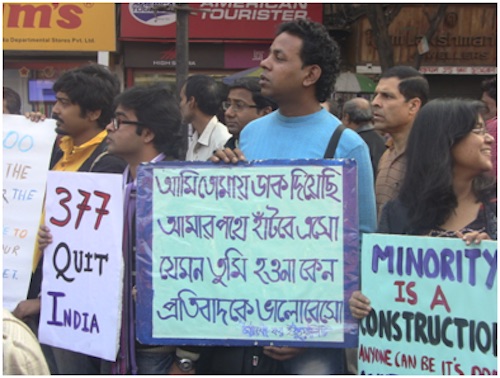Radical Socialist
September 9, 2018
Section 377 of the Indian Penal Code, introduced by the British colonial administration in 1861, criminalized sexual activities “against the order of nature.” On September 6, 2018, the Indian Supreme Court ruled that the application of Section 377 to consensual homosexual sex between adults is unconstitutional. This article celebrates that victory and explains how much more is needed. Radical Socialist is an Indian affiliate of the Fourth International (FI). Solidarity is a U.S. affiliate of the FI. The article first appeared on the Radical Socialist website here.
The Battle is Won! All Hail those who fought. The war continues.

Radical Socialist welcomes the Supreme Court verdict on Section 377 IPC [Indian Penal Code]. This is an important victory for the LGBTIQH community in India. We do not see the victory as a gift from the judiciary, but as the result of decades of battles, on the ground, in grassroots organising, as well as in courts. In this moment of achievement, we hail all those who fought to make it possible. It is not a few elite figures, nor some mainstream liberals, and certainly not any of the major political parties, but large numbers of people in their communities, resisting police violence and blackmail, building militant LGBT organisations, and coming out with their identities, or taking part in the Pride Walks and other programmes, who have made the struggle visible and ultimately won this significant step.
Homophobia and compulsory heterosexuality go hand in hand with male domination, glorification of the family and gendered roles for women. These in turn are buttressed by Brahmanism as well as other religious orthodoxies. And all of them are also connected to capitalist exploitation. This is why many LGBT activists, hailing the toppling of Section 377, also chanted slogans against the UAPA [Unlawful Activities Prevention Act] and demanded the release of civil rights activists.
Repealing Section 377 is not the end of the struggle. Notwithstanding the promise of equality in Article 14 of the Indian Constitution, the social reality is that Dalits [so-called “untouchables”] continue to be sidelined, ill-treated, subjected to violence, excluded from jobs, education and access to many services. The fact that the Supreme Court has completely removed consenting adults from the scope of Section 377 does not mean that LGBTs will immediately achieve equality especially the civil rights to marry; adopt; inherit properties and so on.
That struggle will only now be widened, as greater numbers are emboldened and as they come out declaring their orientation openly. But there have been on one hand attempts at coopting through prioritising small groups of elite LGBTs, and on the other hand aggressive and violent propaganda and threats persist against many LGBTs. Legal redressal cannot solve the issue of social ostracism and deprivations of the sexual minorities. The reworked Transgender Bill is still skewed. The demand for reservation in government jobs and educational institutions are yet to be accepted.
The struggle for recognition as equal humans, the struggle for a right to live life on their own terms, to get equal access to jobs, shelter, health, education — these are struggles where LGBTs have a long way to go. At the same time, these struggles call for unity of the exploited across sectional divisions.
This is not to be confused with pseudo-class, or class reductionist arguments, where the struggles of marginal sexualities are ignored, or rejected as petty bourgeois/ bourgeois reactionary fashionable behaviour. Real class unity will be achieved only when special oppression is acknowledged and its issues seriously addressed within larger class forces. At the same time, therefore, we need to remind people, both in the LGBTIQH communities and in the leadership of working class organisations and left parties, that the bulk of LGBT people are labouring people; and to reject as reactionary the propaganda of those on the left who either treat the struggle as insignificant, or as reactionary, from petty bourgeois moralism disguised as class politics.
Radical Socialist has participated, to the best of its abilities, in struggles of the Queer communities in India. Radical Socialist has argued that the way forward is through mass movements and widest unity of all the exploited, while recognising and fighting for all special oppression. Radical Socialist will continue to be involved in these struggles, as we unitedly fight for our demands.
